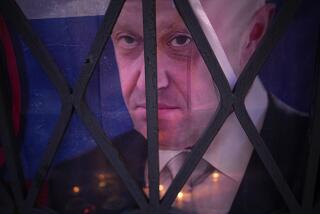Chechen Rebel’s Rise and Fall
- Share via
MOSCOW — His foes called him one of the youngest, fiercest and cruelest of Chechen gang leaders.
But by seizing hundreds of hostages and taking the Chechen war to the heart of Moscow, Movsar Barayev made a bid to become a hero -- or martyr -- of Chechen separatists’ struggle for independence in their southern republic. That choice meant his death in a blaze of violence early today, Russian authorities said.
After Barayev, 23, and his fighters began killing hostages before dawn, Russian forces stormed the building where about 700 theatergoers were being held. He was among those killed in the battle, security official Pavel Kudryavtsev said.
It remains to be seen whether his actions trigger enough disgust with the war among ordinary Russians to benefit the Chechen fighters. The results of his audacious raid could instead provoke a backlash that hurts their cause and only strengthens President Vladimir V. Putin’s determination to crush the breakaway effort.
The hostage-takers had demanded an end to the Russian government’s war on the separatists. Chechens won a degree of autonomy for their republic in the Caucasus region after defeating Russian troops in a 1994-96 war. Russian forces marched back into the republic in 1999 and have battled guerrillas there since.
Barayev was born in the city of Argun in Chechnya, where he grew up in a typical five-floor apartment building.
“He was a tender boy and was a good student,” Zara Satsieva, a neighbor in Argun, told NTV television. “I can’t say anything bad about him.”
But Barayev often was portrayed as a gangster who inherited a kidnapping business once run by his warlord uncle, Arbi, who was killed by Russian forces in June 2001.
Arbi Barayev’s gang was famous in Russia for kidnapping, torturing and executing hostages. NTV television has run footage which it said was from a video made before Arbi Barayev’s death and sent to relatives of one hostage. It shows an unshaven Movsar Barayev smiling and twirling a knife, then lowering the blade toward the neck of an unidentified woman.
Movsar Barayev also was reported to have led a group accused of using a vehicle full of explosives to blow up a Russian military convoy in the Chechen village of Alkhan-Yurt on Dec. 9, 2000, killing 20 soldiers and wounding 17. However, some question whether there is any real evidence of his involvement.
Russian authorities regarded the younger Barayev, operating in the Urus-Martan district of Chechnya, as a conduit for foreign funds sent to the Chechen rebels. Russian security forces twice announced incorrectly that Barayev had been killed, first in August 2001 and again a few weeks ago.
“All the reports about him being the most cruel and fierce thug started to circulate only upon Arbi’s death,” said Musa Muradov, an ethnic Chechen who is the former editor of a newspaper in Chechnya and who is now a correspondent for the Russian newspaper Kommersant. “The federal side needed new scarecrows to frighten the public with, and it needed to report its own victories. Hence these numerous reports about Movsar having been killed a number of times.”
Russian media reported that Barayev received “terrorist training” in Chechnya from an Arab commander known as Khattab, whom the Russians subsequently killed. But Muradov said that the young man could learn all he needed to know from his uncle and that he became a natural leader.
“His uncle gave him a perfect training. Arbi was tough, as tough as it could get,” Muradov said.
Russian security officials say that, after taking over his uncle’s gang, the younger Barayev was known for kidnapping and using Chechen teenagers in terrorist attacks. A Chechen news agency reported three days after his uncle’s death that Barayev had been appointed the new commander of the “Islamic special purpose regiment.”
In an interview Thursday inside the theater with correspondent Mark Franchetti of London’s Sunday Times, Barayev denied being a terrorist. “All we ask for is to pull out the troops from Chechnya,” he said.
Vyacheslav Izmailov, a military analyst with the Novaya Gazeta newspaper, said before the abrupt and bloody end to the standoff that he thought Barayev was willing to negotiate and compromise.
“If he truly wanted to kill these people he would simply have blown up the building -- end of story,” he said.
Barayev grew up with the surname Suleimanov. However, after his uncle’s death he switched to using Barayev, “a name that is believed to strike horror in many hearts in Russia, and chill the blood in people’s veins,” Izmailov said. Barayev “brought the war to Moscow,” he added, “something that Chechen rebels have been promising the Kremlin for a long time.”
More to Read
Sign up for Essential California
The most important California stories and recommendations in your inbox every morning.
You may occasionally receive promotional content from the Los Angeles Times.













